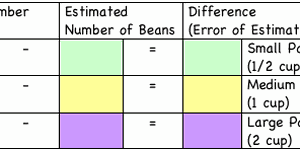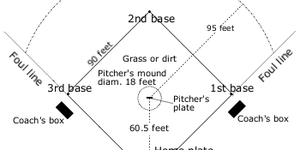Others Like “Frequency of Outcomes in a Small Number of Trials” (top 20 results)
|
This project shows how mathematical probability sometimes contradicts our intuition. Despite the fact that there are 365 days in a year, if you survey a random group of just 23 people there is a 50:50 chance that two of them will have the same birthday. Don't believe it? Try this project and see for yourself.
Read more
You're playing Monopoly with a friend, and you've already got Park Place and you really, really want to get Boardwalk. If you're on Pacific Avenue, what are the chances you'll reach your goal? Here's an easy project that will show you how to find out.
Read more
Have you ever wanted to take a short cut? How about when doing your math homework? In this experiment you can learn how estimation can save you time doing math calculations. But beware, some estimations are better than others! Can you match this sample size with the best population? How accurate are your estimation skills?
Read more
Here's a project that will teach you about math as you follow some of your favorite players or teams. You'll be comparing day-to-day performance with long-term averages, and trying to determine if the "streaks" and "slumps" over shorter time periods are due to random chance or something else. When you've finished, you'll have a better understanding of some important concepts in statistical analysis and baseball.
If a player goes 0-for-20, does that mean anything? Using probability theory,…
Read more
Have you ever wondered how playing in a certain stadium affects how well the athletes perform? Major League Baseball (MLB) is played in ballparks that have their own individual quirks when it comes to the exact layout of the field. How an individual ballpark affects player performance, which is known as ballpark effects, is heavily investigated in the field of baseball. To name just a few parks and their different traits, Fenway Park (the long-time home ballpark for the Boston Red Sox in…
Read more
Block off one-third of a soccer net with a cone, 5-gallon bucket or some other suitable object. Shoot into the smaller side from a set distance, but systematically varying the angle to the goal line. Take enough shots at each angle to get a reliable sample. How does success vary with angle? For a basic project: How do you think your success rate will vary with angle? Draw a conclusion from your experimental results. A bar graph showing success rate at different angles can help to…
Read more
Music has many mathematical elements in it: rhythm, pitch, scale, frequency, interval, and ratio. There are many ways to turn these elements into a science fair project. You can investigate how the scale is based upon a special type of number sequence called a Harmonic Series. Another scale used by Bach, called the "Well-Tempered-Scale" or the "Equal-Tempered-Scale", is based upon a series. How are these mathematical series and ratios related to notes, chords, intervals, and octaves? You can…
Read more
Take shots at a set distance from the basket, but systematically vary the angle to the backboard. For a basic project: How do you think your success rate will vary with angle? Draw a conclusion from your experimental results. A bar graph showing success rate at different angles can help to illustrate your conclusion. For a more advanced project: Use your knowledge of geometry and basketball to come up with a mathematical expression to predict your success rate as a function of angle…
Read more
This project can apply to soccer, hockey, baseball and many other sports. What is the effect of stopping the kick/shot/swing at the moment of impact vs. following through? Think of a way to measure the outcome in each case, and explain your results. (idea from Gardner, 2000, 83-85; for more information with regard to specific sports, see: Barr, 1990, 12-14; Gay, 2004, 142-144; Adair, 2002, 30.)
Read more
You may know Lewis Carroll as the author of Alice in Wonderland, but did you know that in real life he was a mathematician who studied symbolic logic and logical reasoning? How can math help you solve Lewis Carroll's Logic Game? (Bogomolny, 2006) How are algorithms for solving the game Sudoku similar to solving a logic problem? (Hayes, 2006) For the super-advanced mathematical genius, try to evaluate currently available, logic-based computational tools, or design a better one!…
Read more
|
Explore Our Science Videos
How to Build a Paper Speaker
Make an LED Night-Light
Popsicle Stick Catapult







